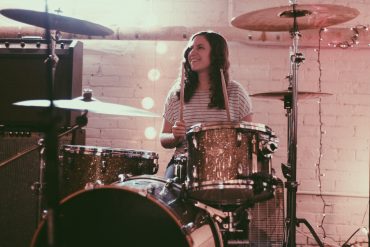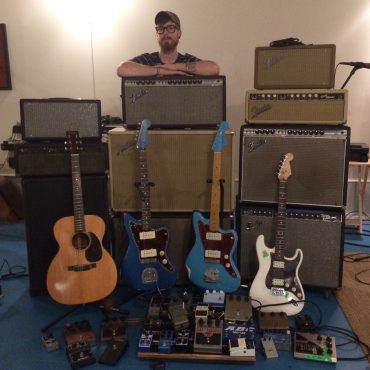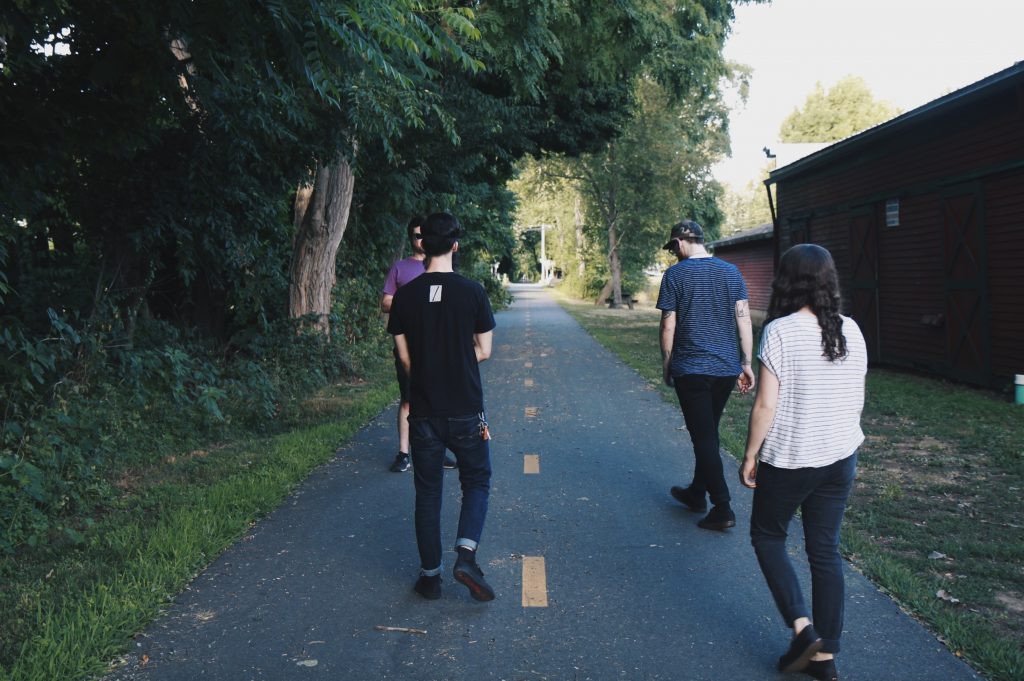Outside of Kindling’s Easthampton practice space, a stretch of fresh asphalt under the sweltering July sun and a couple hundred yards of woods separate us from the impossibly tall Pioneer Valley mountain range.
The instinctual reaction upon leaving the city for a view like this is to breathe in deeply as soon as the trees outweigh civilization. Clean air feels more like a given and less like a commodity outside a city, even if Boston is under a hundred miles away from Western Massachusetts.
Anyone that’s lived a few years of young adult life in rurality knows, though, how quickly the air can stale. The mountains become imposing rather than awe-inspiring, the long winters are almost always a test of sanity. If bigger cities sacrifice nature for a wider spread of culture and voices, the woods are where solitude distracts from bubbling anxiety and fading localism.
Stephen Pierce reminds me of this in the way he points out where the independent cinema used to be as we drive through Northampton in bandmate Gretchen Williams’s car. It’s in his mention later on of a big box store going up in Hadley at the expense of another mom and pop shop closing in town. While Kindling are by no means dour company (even though they jokingly attesting they “were through with sounding fun” after the first demo), it takes a layered kind of love/hate relationship between a band and their surroundings to make a shoegaze album as aggressively present as their upcoming debut, Everywhere Else.
http://soundcloud.com/kndlng/05-weightlessly?in=kndlng/sets/everywhere-else/s-x5MGy
Despite what the layers of menacing guitar and anxiousness of a Kindling record may suggest of its creators, the band are cheerily assembled in their practice space early on a Sunday afternoon.
Williams is behind the kit, leaving her post on guitar and vocals to play the opening of The Jesus and Mary Chain’s “Just Like Honey”. Co-vocalist/guitarist Pierce comes in, mimicking the original’s chiming guitarwork flawlessly as the rest of the band sets up around them.
Their next album is already graphed out on a whiteboard. Past show flyers are framed in a Christmas light shrine. The studio where both Everywhere Else and the next album will be recorded is a couple doors down. Kindling’s operation is concentrated, but intentional given the five-piece have been involved in each other’s lives and bands long before this band was even a thought.
“I was the last in a long line of bassists for the band The Last Forty Seconds, which is how I met Andy [Skelly, drummer],” Pierce recalls. “Yep, Stephen was maybe number seven or eight at that point,” Skelly adds. “He lasted longer than any of the others though.”

Upon The Last Forty Seconds’ eventual dissolution, Skelly and Pierce formed a handful of bands separately, but found regional notoriety together when joining revered Northampton screamo outfit Ampere. The four piece, rounded out by scene veterans Will Killingsworth and Meghan Minior, amassed a legion of fans and toured internationally, but Pierce still had an itch to defy his hardcore background.
“I think I just wanted to play some Superchunk-y guitar parts and just fart out songs like Guided by Voices does. Like, every half thought, for better or for worse,” Pierce recalled. “I had never not played in a hardcore band, so it was about trying to figure out how to write music that isn’t outwardly angsty or aggressive, that has more of a vibe to it.”
Upon briefly moving to Cambridge, Pierce met guitarist and singer Gretchen Williams. “It was winter and I just recorded this shitty pop song, like a minute-and-a-half, three chord song,” Pierce recalls. “Stephen asked me to sing on it and I had never sang in a band that had formally played any shows,” Williams says. “Like, never anything that got to this level.”
In a spurt of Robert Pollard-esque inspiration, the duo wrote and recorded nine songs in a little over two weeks, releasing the Spare Room demo as Kindling in February of 2014. Room is as intimate, but spacey as its name would suggest, tucking its bedroom power-pop under a blanket of distortion in a style the duo affectionately call “throwaway pop”. Even then, both Pierce and Williams began recognizing their shoegaze tendencies as the subgenre was entering its revival phase. Pierce joked that he "doesn't want to be a guided tour of his pedal board" by identifying as a shoegaze band, but more than that, Kindling doesn’t necessarily want to be pigeonholed as a band doing, as Pierce refers to it, “My Bloody Valentine's thing.”
“It’s not inaccurate, obviously. I heard Loveless when I was still solely into punk and hardcore and I couldn’t imagine a guitar could make those noises. I’ve spent pretty much my entire adult life with that record, so its influence would be hard to sidestep. At the same time though, I think their more song-driven stuff on the You Made Me Realize EP was more of a jumping-off point when we started playing together as a full band. There’s, like, a certain danger to those songs that we looked to.”
http://soundcloud.com/kndlng/capital-cities?in=kndlng/sets/everywhere-else/s-x5MGy
As Pierce and Williams decided to let Kindling out of its spare bedroom, the duo sought a band of trusted friends that would understand Pierce’s shift away from hardcore. Andy Skelly was the only choice for drummer because, according to Pierce, “he just plays the shit I have in my head.” A handful of bassists and guitarists rotated in until the band settled on Aaron Snow of prolific ambient pop act Landing and Grist’s Jeff Stevens, who, in standard Kindling fashion, was found a few doors down from them.
“Grist was neighbors with them at [our practice space] Sonelab, so we just stopped in on each other’s spaces all the time,” Stevens says. “I joined days before we went down to Florida for Fest and I remember being nervous because, like, we had only hung out before and being on the road with a band’s a whole different thing than just hanging out. It was just very fun and very positive though; it felt like where I wanted to be.”
To see Kindling in a basement or arts space is to inevitably contemplate how they could even contort a supermassive sound into such a small space.
It’s never a matter of band size or volume (although yes, you should bring earplugs); there’s arena-level ambition inside their punk-raised songwriting, a level of unease in their confidence that feels fully explained on Everywhere Else.
“The title came out of a conversation Stephen and I were having,” Williams recalls. “I was frustratedly, cynically proclaiming that we could leave here, but we’d just end up moving somewhere else that would become what we’re not liking about this area currently.”
“All these outposts [in Western Massachusetts] of progressive weirdness are becoming less weird, less progressive,” Pierce adds. “The exact line, I think, was ’everywhere is becoming everywhere else.”
Cobbling refined updates of songs from Spare Room, their subsequent Galaxies EP, and a few new songs to add to their running dialogue of restlessness, the quintet went into the studio to record Everywhere with revered Northampton producer Justin Pizzoferrato, who previously worked on albums for Pixies, Dinosaur Jr., Speedy Ortiz, and Sonic Youth, at his Sonelab studio.

Pierce at Sonelab courtesy of Kindling.
“One of my favorite parts about them is how they function like a punk band,” Pizzoferrato recalls. “ They came into the studio and banged out basic tracks in one fucking day. Andy Skelly told me he planned on doing [drums] all in a day and I thought he was crazy… he pulled it off effortlessly.”
Still, the brash pop punk edge of “Blinding Wave” and dive-bomb guitars of “Other Times” give way to more tender moments that would’ve never been imagined in a band like Ampere. The search for home builds to a roar midway through “Capitol Cities”, then snuff itself to a contemplative drone, whereas “Vegvísir” somehow manages to make feeling lost anthemic.
“A lot of the lyrics on Everywhere Else have a sense of a sense of escapism, kind of a holdover of that teenage alienation in punk rock,” Pierce explains. “We’re always wondering where is the place for us. Do we create it? Do we move towards it? They’re not questions we know the answer to.”
“It’s something we talk about a lot, the difference between finding a place on a map and that sense of discovery versus finding a place on some [clickbait-y] list,” Williams adds. “I think there's still a restlessness in our lyrics and their delivery. It’s not like we’re floating away, which I like in bands, but restlessness fits us better.”
It’s also in that constant restlessness where it makes sense how Kindling defy the trappings of shoegaze revival or the expectations of a guitar-heavy band coming out of Northampton.
“They're tight and fast and when you strip away the layers of guitars, reverb, and vocals, there's a punk band underneath,” Pizzoferrato says. “The drums are fast and hit hard, the bass growls and goes between octaves quickly and, when you fade in copious amounts of guitar and vocal tracks, you have Kindling.”
https://soundcloud.com/kndlng/other-times/s-UwtyI?in=kndlng/sets/everywhere-else/s-x5MGy
We end the afternoon at The Quarters, an unassuming bar off of a back road in Hadley. Betraying its woodsy surroundings, the bar is a tribute to ‘80s arcades with a few modern flourishes; Pac-man lunch boxes on shelves mingle with flat screens and the bar is awash in the nostalgic neon light of games only a handful of us were old enough to experience firsthand.
Framing Kindling as a band under the same neon light of early ‘90s nostalgia wouldn’t have been too hard before this afternoon. Even their role on Everywhere as seasoned punks still wrestling the town they started out in isn’t a perfectly snug fit.
“There isn’t a cohesive sound out here,” Skelly says when pressed about Western Massachusetts from The Quarters’ patio. “It’s very relaxed with a lot of people doing a lot of things and it’s not in a busy, city-like context either.”
“I’ve heard some people describe it as fractured out here, which I sort of agree with,” Pierce adds. “There’s a lot of little scenes doing their own thing, which, yeah, it would be cool if there were more cross-pollination, but I think it speaks more to the area’s strength that we have all these little pockets without stepping on each other’s toes. It’s empowering, having all these little supportive scenes.”

If there’s any conclusive statement to make on Kindling’s behalf, it’s that they’re willing to keep proving a band with vocalists shrouded in reverb can still be crystal clear on their subversion of corruption and wrongs in the world. This past fall, the band released a cover of The Dicks’ “Hate The Police” with all proceeds going towards an organization working to create further legislation and vigilance against police brutality. The name of the organization could not be released, according to their Bandcamp, “because of the title of the song that we covered.”
“Even though people might not see us as an overtly political band or whatever that entails, it’s important to me to see ourselves as political because I don’t know what it would mean to not see ourselves as political in these times of inequality,” Williams says.
“It’s one of those big question marks, like ‘how can we as a band and as five individuals help?’ Giving money to an organization fighting this shit from that 7” felt like the very least we could do,” Pierce adds. “This great injustice surrounds us; it’s a normal part of our news cycle and it’s not a surprise anymore when these things happen. We want to be aware and part of that conversation, but respectfully so.”
In short, to press Kindling as shoegazers, guitar worshippers of Western Mass, or political punks is too convenient.
“There’s always been this urgency, this immediacy…” Pierce begins when asked to define Kindling.
“We just have a hard time doing things quietly or softly,” Skelly concludes mid-sentence.
Everywhere Else is out later this week on No Idea Records. For more information, check out No Idea's website for vinyl, Disposable America's website for tapes, and Kindling's Bandcamp for digital.


